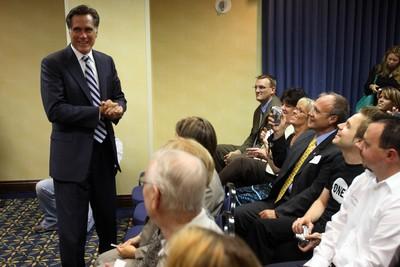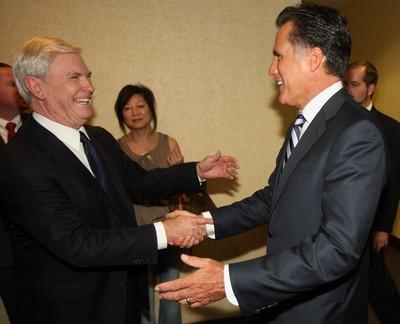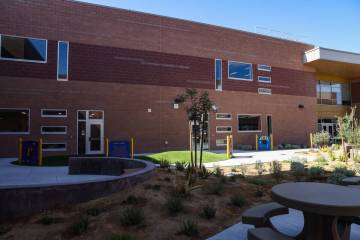Candidate finds familiarity
In most of the states where he campaigns, Republican presidential candidate Mitt Romney's religion is a curiosity, the butt of jokes, something to be feared and mistrusted.
But in Nevada on Tuesday, the former Massachusetts governor, who is a member of the Church of Jesus Christ of Latter-day Saints, found himself among friends, and he found it refreshing.
"It's nice to have a little balance in a state like Nevada," Romney said of his faith in an interview. "There are other states where no one's ever met a member of my church, so it's kind of a bigger burden there. Hopefully familiarity will be a plus in Nevada for me."
Romney campaigned publicly in Las Vegas for the first time Tuesday, speaking for 20 minutes with a group of about 60 supporters in a hotel conference room and then giving a short news conference. He seemed surprised by recent polls -- not the first ones -- that have shown him ahead among Nevada Republicans.
But most analysts chalk much of Romney's appeal in Nevada up to the state's large Mormon population, estimated at 9 percent, the third-highest percentage among the states.
Many members of Tuesday's audience were Mormon and said they were proud of Romney.
"I think it is an asset," Lise-Lotte Newell, a 43-year-old Mormon Las Vegas homemaker, said of Romney's religion. "A number of LDS people have served in public office, and they are known for their honesty and integrity."
Newell said she supports Romney because "I believe he has got great family values, and he's willing to listen to people."
Romney's faith has been dissected in the Washington political media. He has tried with limited success to pitch himself as a generic religious conservative to the Christian conservative voters of Iowa and South Carolina, many of whom regard Mormonism as non-Christian or even a cult.
Social conservatives also might mistrust Romney because of changes in his positions, including on abortion.
Romney has strained to paint himself as a Christian like any other. In a debate in June, he said, "The values that I have are the same values you'll find in faiths across this country."
Larry Call, 64, a member of Tuesday's audience and a Mormon, said he wished Romney would tackle his faith head-on, demystifying it to those who don't understand it. "It's frustrating that people in other places judge us when they don't know anything about us," he said.
"So what, we wear funny underwear," Call joked. "He needs to explain it so they stop talking about it. His religion ought to be helping him. We stand for the values of the American family."
According to the 2001 American Religious Identification Survey, 55 percent of Mormons are Republicans, while 14 percent are Democrats. The church encourages civic involvement, and members vote reliably.
In Nevada, Senate Majority Leader Harry Reid, a Democrat, and Rep. Dean Heller, a Republican, are observant Mormons, as are several state legislators and other elected officials. Republican Gov. Jim Gibbons is a non-observant Mormon.
Asked whether he was proud of his church, Romney said, "Of course I am, and I will in no way try to separate myself from my church, my heritage or my beliefs. But I'm running for a secular position. I'm not running as a Mormon, I'm running as an American. So if people want to learn more about my faith, they can address their questions to my church. But if they want to learn more about my values and my positions, I'm happy to talk about those."
Romney was ahead in a recent poll of Nevada Republicans by a 10-point margin despite spending little time in the state. Last week, he made a campaign stop in Elko; before that, he had been to Las Vegas only for a private fundraiser in March.
Although their nominating caucuses in Nevada are on the same day as the Democrats', Jan. 19, the Republican candidates have paid little attention to the state.
In his speech Tuesday, Romney bragged about spending 300 days in Iowa to win the recent Republican straw poll in Ames, in which his top rivals, former New York Mayor Rudy Giuliani and Sen. John McCain, R-Ariz., did not participate.
Romney didn't try to pretend Nevada would be as high a priority to him as Iowa and New Hampshire; he mentioned Nevada in the same breath as Wyoming, South Carolina, Florida and Michigan, the other states expected to go before the Feb. 5 super-primary in a nominating schedule that continues to shift.
"Nevada is not as well-known a player in the political equation, and so it's a little more difficult to judge what impact Nevada will have," Romney said. "But one thing's clear, it's going to have a lot more impact presumably than the late states. It's going to be a very early state and therefore an important state."
As he left Tuesday's news conference, at which he was joined by former Nevada Gov. Kenny Guinn, a supporter, Romney told Guinn, "I'm going to be back so many times you're going to get sick of me."
The Nevada caucuses and the South Carolina Republican primary are scheduled for the same day. Asked where he planned to be on Jan. 19, Romney said he didn't know. "There's still rumor about changes, and ... you take what you're given as a candidate," he said.
Romney's pitch to voters centers on changing Washington, which he called "fundamentally broken." Before being elected in Massachusetts, he was a successful businessman and ran the 2002 Winter Olympics in Salt Lake City.
"I've spent my life in the private sector, where talk is cheap and if you can't get the job done you're going to get fired," Romney said. "This is not the next stop in my career. I don't have a political career. I've been governor one term. For me this is about making a difference."
Romney declined to criticize President Bush explicitly, reserving his potshots for Democrats.
"My experience has taught me that a person who's willing to respect other individuals and not attack them personally, and who is willing to work to get the job done without worrying who's going to get the credit, is actually able to get things done. ... The willingness of the president to work with good Democrats will allow us to get the job done," he said.
Asked whether Bush had shown such willingness, Romney said, "I think he's tried very hard, and I think it's been a frustrating experience for all concerned."
On Iraq, he said the administration "made a number of errors" in executing the war. He said he would wait and see whether the current troop surge is working; if and when it is, he would draw back U.S. troops in phases, first to a position of "support," then to one of "standby" in nearby countries.
"I want to see the surge successful, and I want to get our troops out as soon as possible," he said. He accused Democrats of wanting to "pull out regardless of the status of affairs in Iraq."
Romney said his approach to foreign affairs would involve "a very substantial increase in diplomacy that would connect us with other moderate Islamic nations and other civilized nations ... to strengthen the foundations of liberal democracy such that these people are able to reject violence."
In Iowa and New Hampshire, Romney on Tuesday began airing a radio ad about illegal immigration, a hot-button issue in Nevada that he didn't mention in his speech.
The ad blasts "cities like Newark, San Francisco and New York City that adopt sanctuary policies," saying they "encourage illegal immigration and undermine secure borders."
Romney denied that the ad was aimed at Giuliani. "It's a shot at cities in this country that continue to describe themselves as zones of protection from immigration laws," he said.
The Giuliani camp has said that three Massachusetts cities had sanctuary policies while he was governor.
Romney said that as president, "I'd impose the same penalties on them that you'd impose on all the others," but it wasn't his place as governor.
"I don't think any governor has ever enforced the federal law on cities. It's up to ... the federal officeholders."
At the same time, Romney listed among his accomplishments as governor that he "empowered the state police to enforce federal immigration law, and they were trained by (Immigration and Customs Enforcement) to be able to do so. So one thing you do is to have elected officials not create a sanctuary environment."
Romney said that after securing the border and requiring employer verification of workers' legal status, he would not try to deport the estimated 12 million illegal immigrants living in the United States, but they would have fewer means and incentives to stay.
The 12 million, he said, would have to "get in line with everybody else, but there should be no special pathway to permanent residency or citizenship for those that have come here illegally. You certainly can't round up 12 million people, put them in buses and deport them."
Romney said his policies would "gradually and humanely replace illegal workers with our own citizens and with legal aliens" in the work force.
When he was asked about the touchy subject of the proposed nuclear waste repository at Nevada's Yucca Mountain, Romney was standing next to Guinn, like most Nevadans, a staunch opponent of the dump. Romney was equivocal.
"I can tell you that I would make sure that in no circumstances would we ever do anything that would put the well being or the health of Nevadans at risk," Romney said. "This is a matter which is being currently studied and reviewed. We'll want to see what the results of that review are. Don't forget I'm a governor and I ... don't like it when the federal government comes in and starts telling the state what they're going to do with the state's property."
Guinn said he was satisfied with that answer.
"I know the data he's going to be looking at," Guinn said. "As he spends more time with Nevadans and hears what we have to say about it, and when he sees the material that we've collected for him and that others have collected for him ... I think he'll come to the same conclusion as most of us have."


















